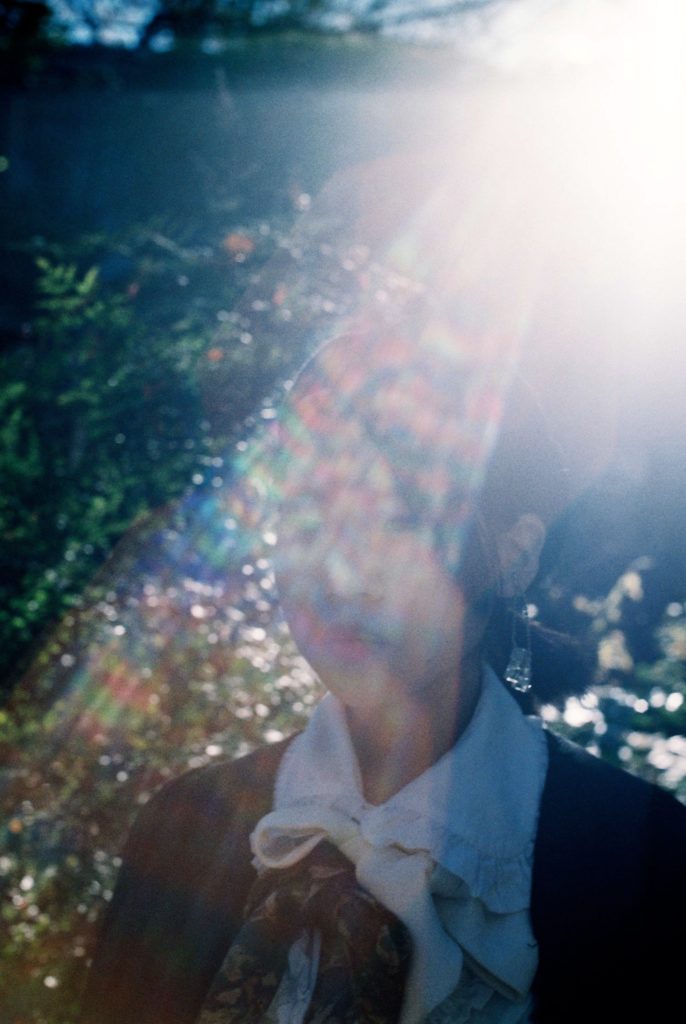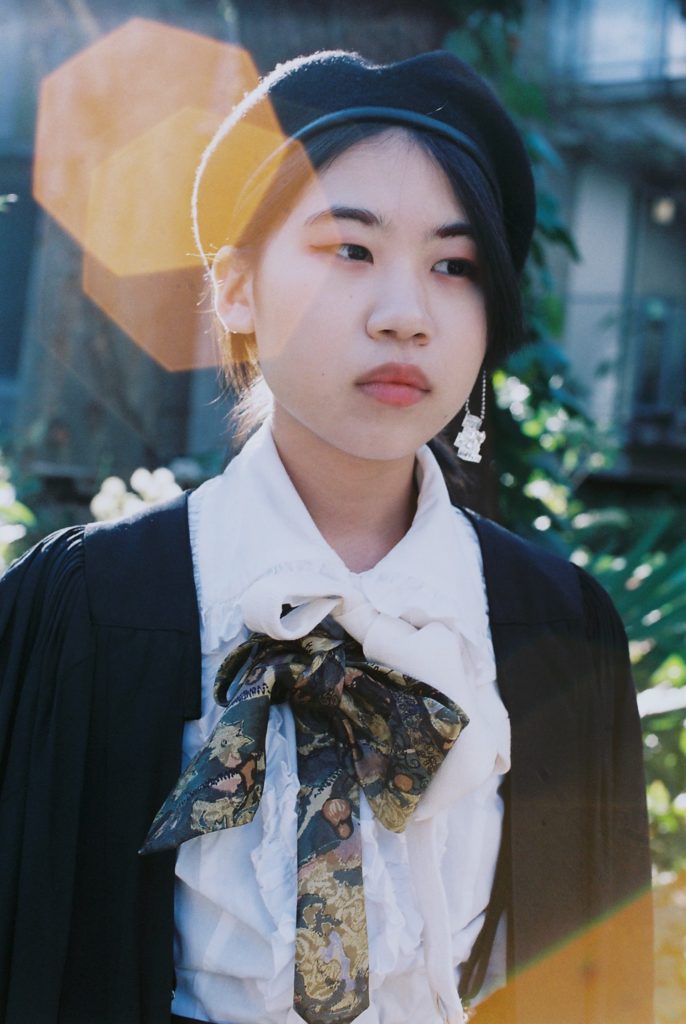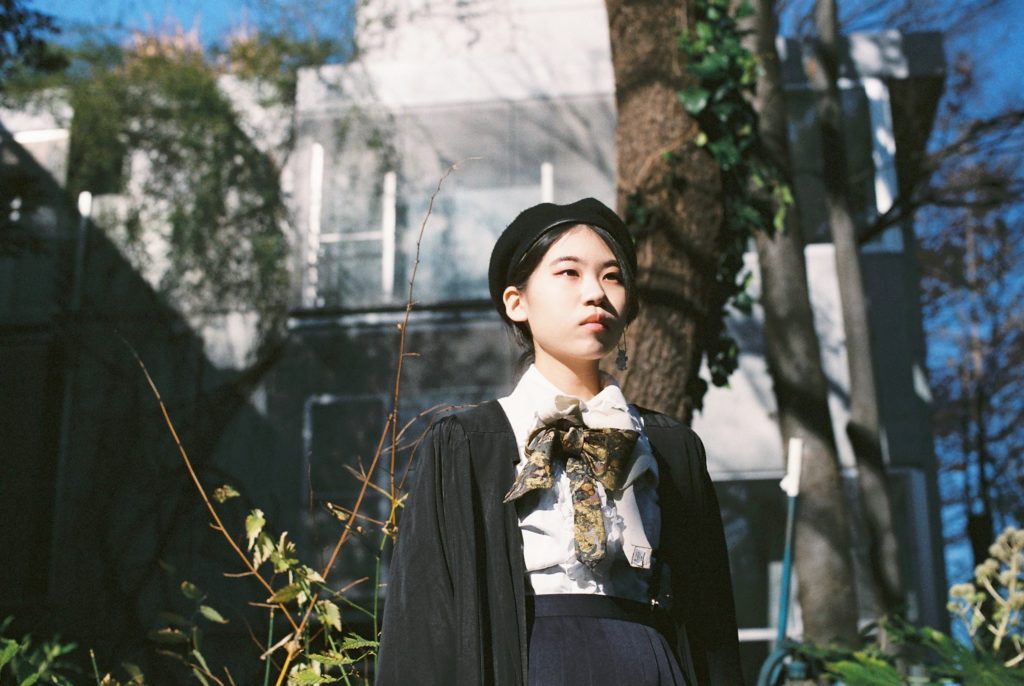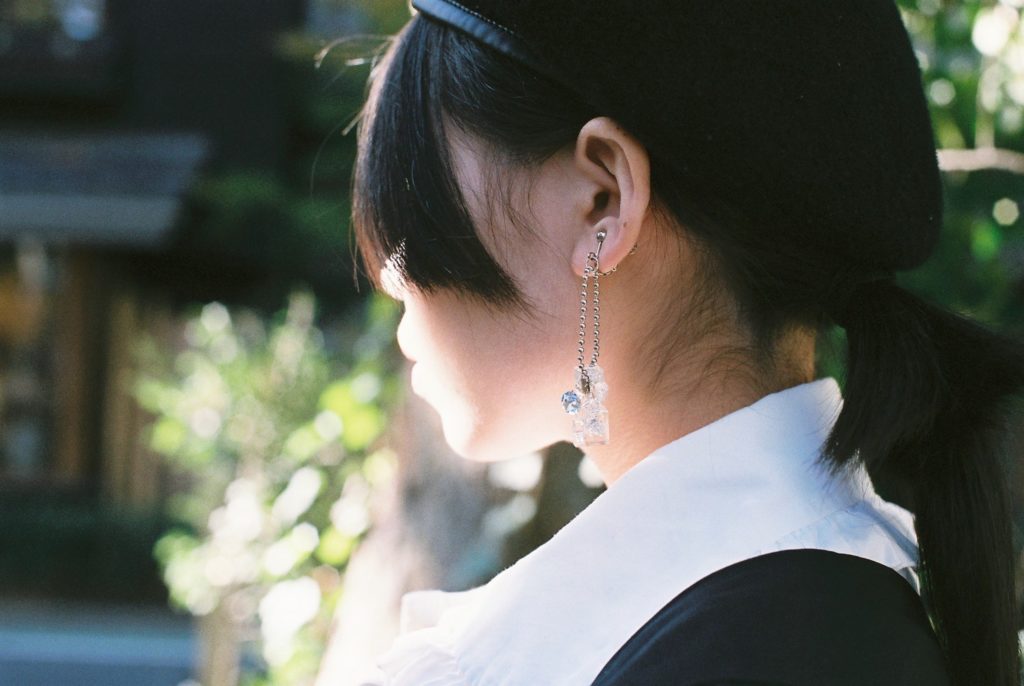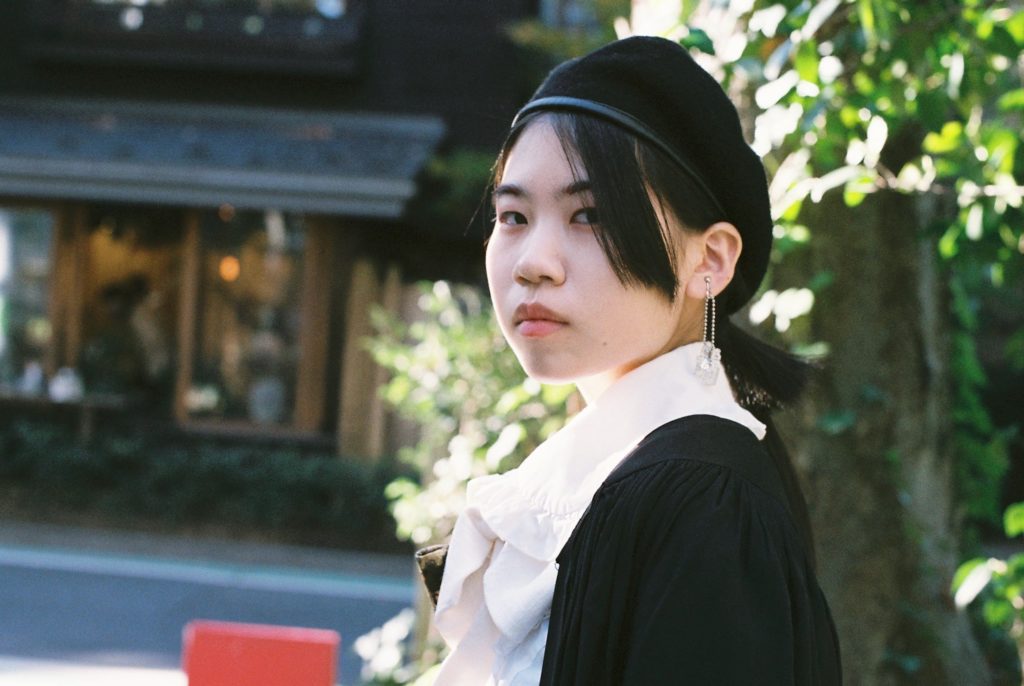
Singer-songwriter Yukichi Kasaku/men, currently 17 years of age, started writing songs in the sixth grade using GarageBand on an iPhone. They’re gaining attention from many people because they wrote songs for the idol group, Dempagumi.inc. Yukichi Kasaku/men creates a rich and complex lyrical world of their own by packing a punch with every word. The productions are also off-kilter; the song structures deviate from conventions. Everything about them is refreshing. They’re gifted with unique sensibilities and a free spirit, which aren’t restricted by norms. It’s not a stretch to say that alongside Hakushi Hasegawa, Ohzora Kimishima, and Soushi Sakiyama, Yukichi Kasaku/men symbolizes the new generation. We sat down with the singer-songwriter, who hasn’t made their debut yet, to listen to what they think of “the now.”
──You started making music when you were in the sixth grade. Did you like music before then?
Yukichi Kasaku/men (Yukichi): I first started listening to music when I was in the third or fourth grade, and that was when I liked Vocaloid music. The thing is, I’m an otaku (laughs). Instead of the music itself, I was more drawn to the characters and content surrounding Vocaloid music. I wasn’t super into music, but I liked singing. And at one point, I started paying attention to Sheena Ringo’s vocals, and I liked her too. Aside from music, I also loved writing. So, I began wanting to create music because I wanted to use words. That was the catalyst.
──How did you start creating music on your iPhone?
Yukichi: I started doing that when I began liking music. Even if it’s not music, I tend to create something by myself whenever I like something. And that “something” happened to be music. As a sixth-grader, I played the piano and made songs, even though I couldn’t play it well despite taking lessons. Then, when I was an eighth-grader, I decided to apply for this audition in my hometown (“Yukie Kamiya’s Declaration of Independence, The ☆ Audition” hosted by K-mix). Because I couldn’t play any instruments, I thought it would be faster to compose a song using a computer. But I didn’t have one, so my mother found the GarageBand app on my iPhone. I used the app for the first time, and I didn’t know how to use it, but I just tried to make something. I met Soushi Sakiyama and other artists that applied for the same audition and began playing live at different places in Shizuoka prefecture, where I’m from, through those connections. I didn’t have that, “This is picking up. Music is the thing for me!” moment.
Yukichi Kasaku/men is like a social media account
──You started posting your original songs onto SoundCloud in 2018. By then, you already went by the name “Yukichi Kasaku/men.” Did you think, “I want to pursue music” later on?
Yukichi: I don’t think so, no. Before creating an account on SoundCloud, I already had a Twitter account. I just liked using that name for my social media accounts. You know how you can pick the name of your choice and exist as an account online? That feeling grew on me. I obviously wanted to make music when I started uploading songs online, but it wasn’t like I was looking to become a musician. It was more like, “I made an account by the name of Yukichi Kasaku/men.”
──Do you mean Yukichi Kasaku/men is separate from you as yourself?
Yukichi: Yes. It’s not about which me is the “real” me because there are many versions of myself, and I feel like the number will only keep on growing.
──When it comes to songwriting, you come up with the lyrics first and then create the melody afterward. Do you make songs with any images or themes in mind?
Yukichi: I do think there is a theme or cohesiveness to the lyrics regarding the songs on my SoundCloud. I made some songs after I was like, “This is what I’m going to write about.” Other times, I was like, “I guess this is what I’m saying here,” after I completed them. But the songs I made after my most recent one on SoundCloud (“Prototype-11,” released on January 2019) aren’t like that at all. When I had a theme back then, I would write the lyrics first. But recently, I do most things simultaneously. I don’t feel the need to convey anything specific through my lyrics now. I think I place importance on the words’ rhythm and how they feel when I say them.
──I feel like your lyrics are a manifestation of your imagination; it’s as if they’re a sequence of images. How do you come up with your lyrics?
Yukichi: If I already have a melody ready, I create lyrics that go with that. I have my standards like, “This type of rhythm goes with this melody, and these are the only words that go along with it.” I make songs according to that. For example, there was an instance where I just had to use the word “Horo” when I was writing lyrics on top of a melody. I didn’t even know if that was an actual word. I looked it up, and “幌” came up, which is one of the kanji characters for “Sapporo” (札幌). Apparently, there is a definition for it. I thought, “If it’s a real word, I can use it.” And so I did. There are many cases where I use certain words because of how they sound.
──At times, you use words that feel out of place, such as “kidney” and “a stupid cherry.” Do you want to catch people off guard like, “This song feels good, but something about it is off”?
Yukichi: I think a part of me does. I enjoy it when I feel a bit uncomfortable when I come across writings that I’m unfamiliar with. That’s how I came to like words. I want to incorporate that feeling in my music so that other people could experience it too. I typically use words I like in my songs, so.
──By “uncomfortable,” do you mean things that evoke grotesque or disturbing feelings?
Yukichi: I feel like that was the case at times. But I don’t have any rules or anything. I use words I like, whenever I like, in my lyrics without any specific order. That’s all. At first, if I wanted to make a song but didn’t have anything to say, I felt like I had to squeeze the words out of myself. But I realized it didn’t have to be that way. Now, I feel like it’s less about the meaning of the lyrics and more about listening to words as though they’re music too. I think it’s fun to create songs that make me go like, “It feels good to say words like this. It feels like I’m saying a tongue twister.”
Not creating a chorus is what makes them unique
──Out of the three songs you wrote for Dempagumi.inc, I’m especially interested in Nagi Nemoto’s solo track, “Yume Wo Miru.” It’s such an intriguing song where you can’t tell which part is the chorus.
Yukichi: This goes to my latest songs too, but I’m not good at composing songs that are like, “This is the chorus!” I believe it’s not always necessary to have the climax, the peak. It might be the norm for people to come up with the first verse, the bridge, and the chorus. If it doesn’t feel right to put the chorus after the bridge, I go onto the next verse. When I had a meeting with Nemoto-san, she told me, “You can make whatever you want,” and so I wrote a song the way I usually do. That song is a result of that.
──Typically, songs follow a structure like, “first verse → bridge → chorus → second verse → bridge → chorus → interlude.” You repeat the same progression, right? But with this song, it’s like you go onto the next verse, and the next verse, and the next verse. You don’t repeat anything. So, you don’t follow such norms when you make music?
Yukichi: Yes. When Soushi Sakiyama and I wrote a song together (“Mugen・,” released in 2019), we both wrote our own choruses and used both of them in the song. If you were to count the beginning bit and the ending as two choruses, there are about four different choruses. When I thought about it, I realized it was okay to make music in that way. I’ve always been the type of person who doesn’t have strict, stoic views. So, I’m alright with letting songs come about naturally and without force. When I made “Yume Wo Miru,” I went with the flow. I thought it was unnecessary to be like, “This part needs to come after this part because of x y z.”
──I bet your fans are patiently waiting for you to release new music. Do you have any confirmed release dates?
Yukichi: I don’t, but I’m trying my best to compose music. I hope everyone can wait for it.
──Lastly, could you talk about what sort of artist you want to become
Yukichi: I change my mind about what sort of person I want to become all the time. I tell people that I’m not even sure if I’ll be thinking what I’m thinking about today when tomorrow comes. I partially control how I am in the moment. But my thinking differs from moment to moment, and so who I “am” changes too. It’s okay to be like, “This is who I am right now,” and act according to that. I hope I can continue doing music and other things too. I want to do so many different things.
──You might quit music out of nowhere?
Yukichi: It’s scary, isn’t it (laughs)? I don’t want to quit music, but my thinking does change a lot. For now, I’ll give it my all.
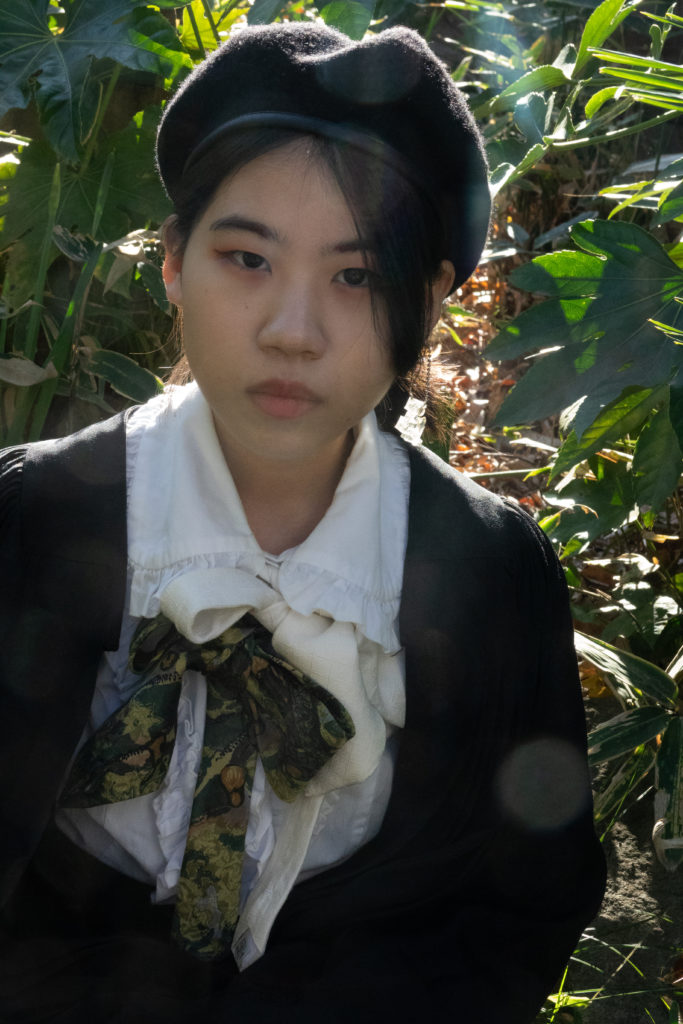
Yukichi Kasaku/men
Yukichi Kasaku/men is a musician born in 2003. When they performed at Mikakunin Festival as a middle school student, they received the special jury award. They also got second place for Eggs’, an Indie music streaming site, annual ranking. Yukichi Kasaku/men gained attention after writing “Keijijougakuteki, Mahou” for Dempagumi.inc, which was released in June 2019. The music video for their collaborative song with Soushi Sakiyama called “Mugen・” has over 800,000 views on Youtube. Further, they created the theme song for Yuji Sakamoto’s stage play, Wasure Enu Wasure Enu. In November 2020, Yukichi Kasaku/men released a collaboration song, “Lucid Dream” with hip hop band Afro Parker. Aside from music, they also write and draw illustrations — their creativity is unbound.
https://soundcloud.com/yukichikasaku
Twitter:@kasaku_men
Instagram:@ykckskmen
Photography Yoko Kusano
Translation Lena Grace Suda

